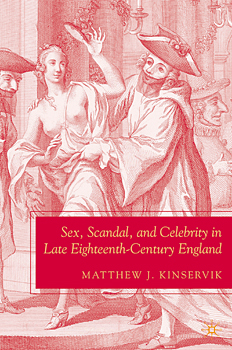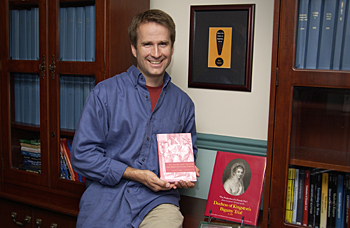
“The book began as a biography of an 18th-century actor and theatre manager named Samuel Foote,” Kinservik said. “But as soon as I got into researching the end of his career, which ended with a scandalous trial for attempted sodomy, I realized there was an entire book telling that story. I'd never done any work previously on sexuality studies or the legal history of marriage, but that all became necessary background to telling Samuel Foote's case.”
After discovering early in his research several glaring inconsistencies between early manuscripts by Foote and those actually set into print, Kinservik followed a paper trail of clues that led him from the Huntington Library in San Marino to libraries at Harvard and Yale to the House of Lords Record Office in the High Court of Parliament in London.
Along the way, he uncovered even more discrepancies that fueled his research and inspired him to challenge long-held misperceptions, among them the fact that Samuel Foote “was not a martyr.”
“The Huntington Library is where I discovered a huge discrepancy between the manuscript and the print versions of [Foote's] plays, and it's very daring to see him making fun of the idea of attempted sodomy, which you wouldn't expect to see on the stage in the 18th century. That was the first literary evidence that there was a bigger story,” Kinservik said.
“Foote was a mimic, which was illegal, and he had a public persona of being a dangerous and risky comic actor and playwright, but he was friends with royalty, so he got away with things other people couldn't,” Kinservik said.
Despite this, Kinservik said that scholars persisted in portraying Foote as a tragic figure who suffered for his art and was broken in the end by the malicious prosecution funded by the Duchess of Kingston in retribution for a nasty play he'd written about her.
“Scholars were blind to how powerful and how close Foote was to royalty, and to how undangerous he really was,” Kinservik said. “What theatre historians and literary critics have done at the end of Foote's career is to have presented him as a victim, victimized for his illicit sexuality. But this ignores the fact that Foote won his case. He was acquitted. The king and queen supported him at crucial times during this trial, and he won and vanquished his enemies. There was a personal cost, but to call him an 18th-century version of Oscar Wilde, who really was a martyr, really misrepresents Foote.”
In the process of telling Foote's story, setting the record straight and placing his trial in its 18th-century context, Kinservik gives equal time in his 250-page book to the Duchess of Kingston and her own trial for bigamy and to the reign of King George III against the backdrop of civil unrest in the American colonies. In doing so, he exposes political and social inconsistencies and shams and draws parallels to contemporary situations where the focus gets skewed.

“In a way, this book is a cautionary tale about where you put your energies as a society,” he said. “Marriage was a crazy institution in the 18th century, and the regulation of it was absolutely barbaric and medieval. We are much more decorous and polite about it nowadays. We don't worry a lot about bigamy, but we do worry a lot about divorce, and at the bottom of both issues is an anxiety about marriage and about how well a society is handling it.
“Sodomy is still a huge moral issue nowadays,” Kinservik said. “We've decriminalized it in the United States in the past two years, but what is the cost of trying to police private conduct too closely?”
Kinservik, who said that the book's publisher, Palgrave Macmillan, debated before listing the book in the category of literature, said that he wrote the material “with a generalist reader in mind,” and learned to alter his writing style in the process.
“Writing for a general audience taught me things about my topic because I was under an obligation to explain things in a way that I don't have to for academic books and articles,” Kinservik said. “Ultimately, it's a much more useful book.”
Now in the process of planning another “spin-off” book, Kinservik said he enjoyed writing for a generalist audience so much that he plans to continue with that style. “I enjoyed writing this book a lot,” he said. “It's a pretty gripping narrative. And I think more people will end up reading this than they will anything else I've written. In writing this book I had to think about why it might be interesting to people who aren't just like me, and given the new economy of University presses, I think that's very healthy.”
Sex, Scandal, and Celebrity in Late Eighteenth-Century England is available through Amazon.com, the University Bookstore and other local book vendors.
Article by Becca Hutchinson

